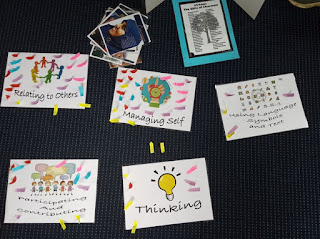I've always believe in creating a positive learning environment for my students and where they feel that they are excepted. It is also important to establish a strong learning environment where students can experience success.
Dalton and Smith (1986) believe it is important to 'organise materials systematically so that the students have easy access to them.' It also states that for students to 'function independently they need to know what resources are available, where they are housed and how to collect, use and return.'
Therefore, Room 4 got a complete overhaul, with a variety of learning opportunities, lots of little corners for students to work at and to use resources (easily displayed) when necessary and if they so choose.
Dalton and Smith (1986) believe it is important to 'encourage children to learn with different people, for example by themselves, with a partner, in a small group, with older and younger children or with adults.' We will [again] have learning buddies (not set) in our learning environment and engage with the older students in the school via buddy reading.
Cultural awareness is important as students come from a variety of different backgrounds and cultures. I believe my learning environment should embrace the diversity and uniqueness of all learners to enable them to be confident in their identity, language, culture and abilities. I will use and develop the use of te reo and tikanga Māori in our learning environment and will be responsive to Māori celebrations (Matariki / Māori Language Week). Karakia plays an important part in my daily programme, as is the participation in a weekly Kapa Haka session.
Dalton and Smith (1986) believe it is important to 'organise materials systematically so that the students have easy access to them.' It also states that for students to 'function independently they need to know what resources are available, where they are housed and how to collect, use and return.'
Therefore, Room 4 got a complete overhaul, with a variety of learning opportunities, lots of little corners for students to work at and to use resources (easily displayed) when necessary and if they so choose.
Dalton and Smith (1986) believe it is important to 'encourage children to learn with different people, for example by themselves, with a partner, in a small group, with older and younger children or with adults.' We will [again] have learning buddies (not set) in our learning environment and engage with the older students in the school via buddy reading.
Cultural awareness is important as students come from a variety of different backgrounds and cultures. I believe my learning environment should embrace the diversity and uniqueness of all learners to enable them to be confident in their identity, language, culture and abilities. I will use and develop the use of te reo and tikanga Māori in our learning environment and will be responsive to Māori celebrations (Matariki / Māori Language Week). Karakia plays an important part in my daily programme, as is the participation in a weekly Kapa Haka session.
McGee and Fraser (2008) said that 'caring and a sense of community are related to feelings of belonging in the classroom, and students' motivation, achievement and efficacy beliefs are enhanced when the feel they belong'.
Having a positive classroom community also creates a sense of self worth and belonging which will help to develop a 'team work attitude'. Students were learning to use the Virtues of 'Respect' and 'Co-operation' on the first day...!
Having a positive classroom community also creates a sense of self worth and belonging which will help to develop a 'team work attitude'. Students were learning to use the Virtues of 'Respect' and 'Co-operation' on the first day...!
References:
Dalton, J., & Smith, D. (1986). Extending Children's Special Abilities - Strategies for primary classrooms. Victoria, Australia: Ministry of Education Victoria.
McGee, C., & Fraser, D. (2008). The Professional Practice of Teaching. South Melbourne: Cengage Learning Australia Pty Limited.
~ "Learning is a treasure that will follow its owner everywhere" - Chinese Proverb ~













